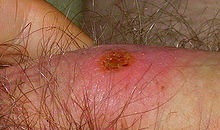- Chancre
-
A chancre (
 /ˈʃæŋkər/ shang-kər)[1] is a painless ulceration (sore) formed during the primary stage of syphilis. This infectious lesion forms approximately 21 days after the initial exposure to Treponema pallidum, the gram-negative spirochaete bacterium yielding syphilis. Chancres transmit the sexually transmissible disease of syphilis through direct physical contact. These ulcers usually form on or around the anus, mouth, penis, and vagina. Chancres may diminish between three to six weeks without the application of medication.
/ˈʃæŋkər/ shang-kər)[1] is a painless ulceration (sore) formed during the primary stage of syphilis. This infectious lesion forms approximately 21 days after the initial exposure to Treponema pallidum, the gram-negative spirochaete bacterium yielding syphilis. Chancres transmit the sexually transmissible disease of syphilis through direct physical contact. These ulcers usually form on or around the anus, mouth, penis, and vagina. Chancres may diminish between three to six weeks without the application of medication.In addition, chancres are associated with the African trypanosomiasis sleeping sickness, surrounding the area of the tsetse fly bite.
Contents
Etymology
The word "chancre" (French pronunciation: [ʃɑ̃kʁ]) means "little ulcer" in Old French. Related to the English "canker", they both come from the Latin cancer, meaning crab,[2] which is a translation from the Greek word "καρκἰνος (karkínos)", also meaning crab.[3]
Similarities with chancroid
Similarities between the conditions chancre and chancroid:
- Both originate as pustules at the site of inoculation, and progress to ulcerated lesions
- Both lesions are typically 1–2 cm in diameter
- Both lesions are caused by sexually transmissible organisms
- Both lesions typically appear on the genitals of infected individuals
Differences from chancroid
Differences between the conditions chancre and chancroid:
- Chancre is a lesion typical of infection with the bacterium that causes syphilis, Treponema pallidum
- Chancroid is a lesion typical of infection with the bacterium Haemophilus ducreyi
- Chancres are typically painless, whereas chancroid are typically painful
- Chancres are typically non-exudative, whereas chancroid typically have a grey or yellow purulent exudate
- Chancres have a hard (indurated) edge, whereas chancroid have a soft edge
- Chancres heal spontaneously within three to six weeks, even in the absence of treatment
- Chancres can occur in the pharynx as well as on the genitals
See also
- Primary cutaneous histoplasmosis
References

This medical sign article is a stub. You can help Wikipedia by expanding it.

